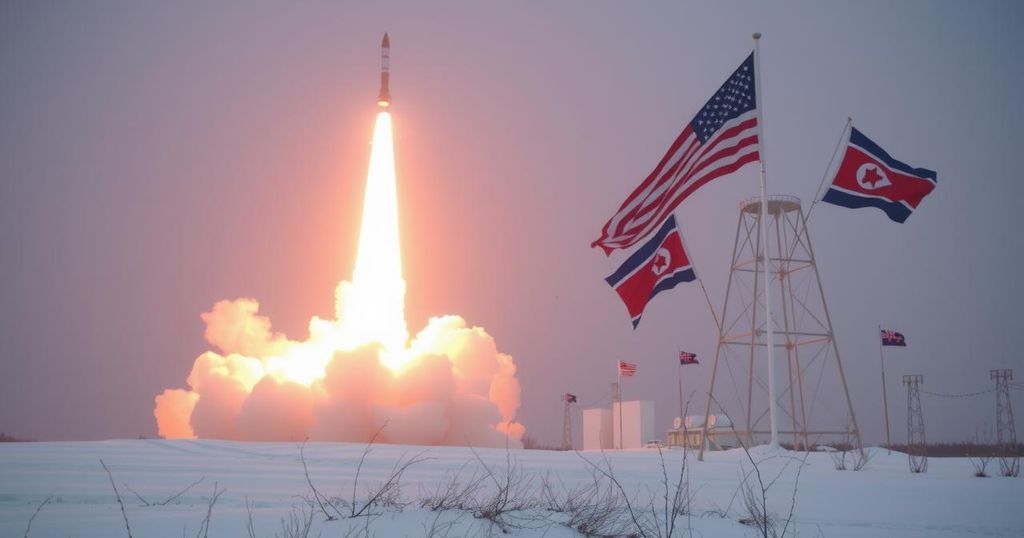North Korea’s Missile Launch Amidst U.S. Concerns Over Russian Collaboration
North Korea launched a missile during Secretary of State Antony Blinken’s visit to South Korea, where he warned about closer ties between Pyongyang and Russia, particularly in advanced military technology. Blinken reiterated U.S. support for South Korea amidst the ongoing political crisis and emphasized the importance of trilateral cooperation in addressing North Korean threats.
On Monday, amidst U.S. Secretary of State Antony Blinken’s visit to South Korea, North Korea conducted a missile test, highlighting escalating tensions in the region. Blinken cautioned that North Korea appears to be intensifying military collaboration with Russia, particularly in advanced space technology. Investigations into the impeachment of South Korea’s conservative President Yoon Suk Yeol, who has taken shelter following his failed martial law attempt, further complicated Blinken’s discussions, which included promoting enhanced cooperation with Japan.
As the missile, reportedly traveling approximately 1,100 kilometers (680 miles), was launched, Blinken underscored the importance of trilateral military exercises and intelligence sharing among the U.S., South Korea, and Japan. During a joint news conference with South Korean Foreign Minister Cho Tae-yul, Blinken condemned the missile launch and warned of increasing Russian support to North Korea in exchange for military assistance in its conflict against Ukraine.
He stated, “Now we have reason to believe that Moscow intends to share advanced space and satellite technology with Pyongyang,” adding that this development poses a serious threat to international consensus against North Korea’s nuclear ambitions. Reports indicate that North Korea had previously dispatched thousands of troops to Ukraine, resulting in significant casualties.
While in South Korea, Blinken acknowledged the challenging political climate marked by Yoon’s attempts to impose martial law and his controversial governance. He reiterated U.S. confidence in South Korean democratic institutions, expressing unwavering support for the Korean populace. The backdrop of Blinken’s visit coincided with the anniversary of the January 6 Capitol riots, stirring divided sentiments within South Korea regarding leadership and governance.
Blinken’s discussions seemingly aimed to solidify U.S.-South Korea relations and a unified stance against North Korean provocations. Despite the tense atmosphere, South Korean officials reassured Blinken of their commitment to the principles established during the August 2023 Camp David summit, which further emphasized cooperation with Japan and a strong U.S.-South Korea alliance.
In light of North Korea’s missile launches, geopolitical dynamics in East Asia continue to evolve, raising concerns among the United States and its allies, particularly South Korea and Japan. The growing alliance between North Korea and Russia has been a focal point for U.S. diplomatic efforts, particularly under the recent U.S. administrations that adopt contrasting strategies to deal with North Korean aggression. The political climate in South Korea remains precarious with the ongoing investigations into President Yoon Suk Yeol’s controversial actions, reflecting the broader implications of leadership stability on international relations in the region. Previously, former President Donald Trump’s unique approach to engagement with North Korea juxtaposes President Joe Biden’s strategy focused on diplomatic efforts aimed at de-escalating nuclear tensions. In the context of these developments, Secretary Blinken’s visit serves as a crucial engagement moment to reinforce commitments among allied nations against North Korean provocations and to address increasing hostilities arising from the ongoing conflict in Ukraine.
In conclusion, North Korea’s missile test during Secretary of State Antony Blinken’s visit underscores the pressing need for robust diplomatic and military collaboration among the United States, South Korea, and Japan. The escalating collaboration between North Korea and Russia presents a daunting challenge to regional stability, prompting reaffirmed commitments to collective defense strategies. As South Korea navigates its internal political turmoil, the U.S. remains focused on supporting its ally and ensuring that both nations can effectively address threats posed by North Korea’s advancing military capabilities.
Original Source: www.dawn.com




Post Comment